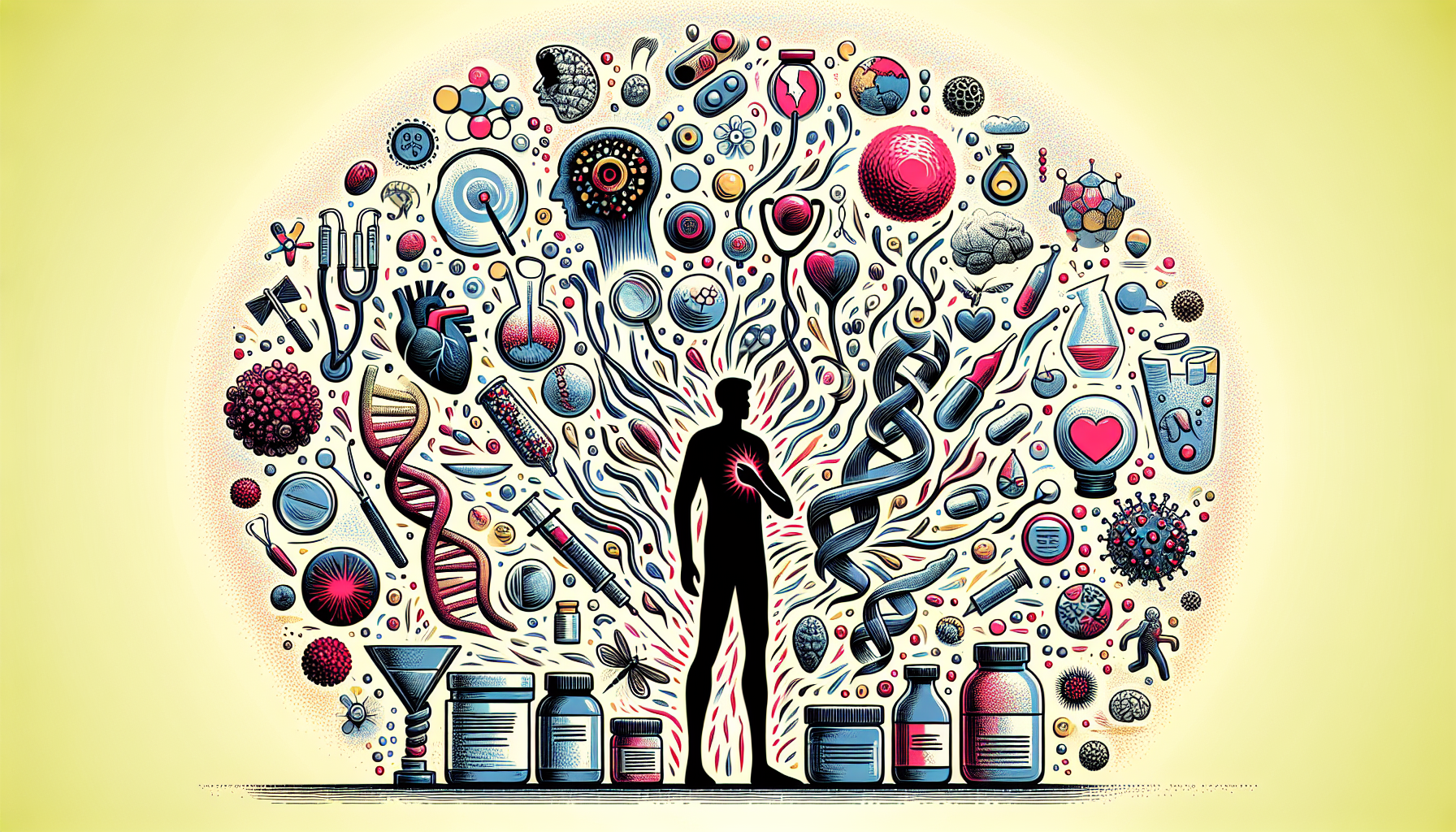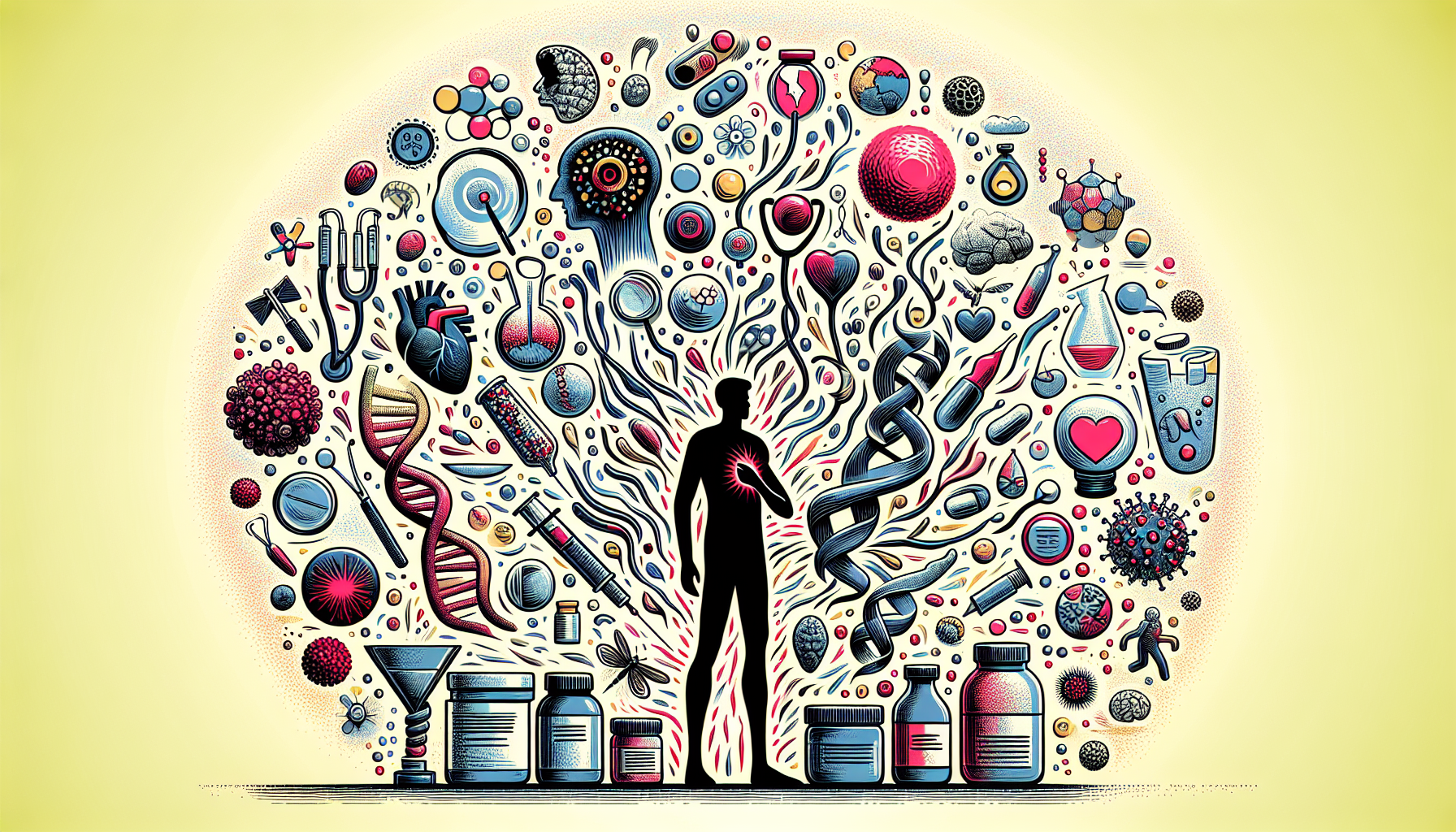Are you looking for a comprehensive resource that provides information on various health problems? Look no further! The “Health Problems List” is here to offer you a detailed compilation of common health issues that people face. From allergies to chronic conditions, this handy guide covers it all. Whether you’re seeking knowledge for personal reasons or helping a loved one navigate their health journey, the Health Problems List has got your back. Stay informed, stay healthy!

Cardiovascular Health Problems
Coronary Artery Disease
Coronary artery disease occurs when the blood vessels that supply oxygen-rich blood to the heart become narrowed or blocked due to the buildup of plaque. This condition can lead to chest pain, also known as angina, as well as shortness of breath and fatigue. If left untreated, coronary artery disease can eventually result in a heart attack.
Heart Attack
A heart attack occurs when the blood flow to a part of the heart is blocked, usually due to a blood clot. This can cause damage to the heart muscle and may even be life-threatening. Symptoms of a heart attack can include chest pain, shortness of breath, nausea, and lightheadedness. Immediate medical attention is crucial in the event of a heart attack.
High Blood Pressure
High blood pressure, also known as hypertension, is a condition in which the force of blood against the walls of the arteries is consistently too high. Over time, this can lead to serious health problems, including heart disease, stroke, and kidney disease. Lifestyle changes, such as maintaining a healthy diet and exercise routine, along with medication, can help manage high blood pressure.
Stroke
A stroke occurs when the blood supply to the brain is interrupted, either due to a blockage or a burst blood vessel. This can result in brain damage and a range of symptoms, including sudden numbness or weakness on one side of the body, difficulty speaking or understanding speech, and impaired vision. Immediate medical attention is crucial in order to minimize the long-term effects of a stroke.
Congestive Heart Failure
Congestive heart failure is a condition in which the heart is unable to pump enough blood to meet the body’s needs. This can lead to symptoms such as fatigue, shortness of breath, and swelling in the legs and ankles. Congestive heart failure often develops as a result of other cardiovascular conditions, such as coronary artery disease or high blood pressure, and requires ongoing medical management.
Respiratory Health Problems
Asthma
Asthma is a chronic respiratory condition characterized by inflammation and narrowing of the airways, which can cause wheezing, coughing, and difficulty breathing. Triggers for asthma attacks can include allergens, exercise, and respiratory infections. While there is no cure for asthma, it can be managed through the use of medication and avoidance of triggers.
Chronic Obstructive Pulmonary Disease (COPD)
COPD encompasses a group of progressive lung diseases, including chronic bronchitis and emphysema, that cause airflow obstruction and breathing difficulties. It is most commonly caused by long-term exposure to harmful substances, such as tobacco smoke or air pollution. Treatment for COPD focuses on managing symptoms and slowing the progression of the disease.
Pneumonia
Pneumonia is an infection that inflames the air sacs in one or both lungs. It can cause symptoms such as cough, fever, chest pain, and difficulty breathing. Pneumonia can be caused by bacteria, viruses, or fungi, and treatment depends on the underlying cause. Vaccines and good hygiene practices, such as regular handwashing, can help prevent pneumonia.
Bronchitis
Bronchitis is an inflammation of the bronchial tubes, which carry air to and from the lungs. It can be acute or chronic, with symptoms including cough, chest discomfort, and production of mucus. Acute bronchitis is often caused by a viral infection and resolves on its own, while chronic bronchitis is typically a result of smoking or long-term exposure to irritants.
Lung Cancer
Lung cancer is a type of cancer that starts in the lungs and can spread to other parts of the body. It is most commonly caused by long-term exposure to tobacco smoke. Symptoms of lung cancer can include coughing, chest pain, weight loss, and shortness of breath. Early detection through screenings and quitting smoking are key in improving outcomes for lung cancer patients.
Digestive Health Problems
Gastroesophageal Reflux Disease (GERD)
GERD occurs when stomach acid flows back into the esophagus, leading to symptoms such as heartburn, chest pain, and difficulty swallowing. Lifestyle changes, such as avoiding trigger foods and maintaining a healthy weight, along with medication, can help manage GERD symptoms. In severe cases, surgery may be recommended.
Peptic Ulcer Disease
Peptic ulcer disease is characterized by painful sores in the lining of the stomach or the first part of the small intestine. It can be caused by a bacterial infection or long-term use of certain medications, such as nonsteroidal anti-inflammatory drugs (NSAIDs). Treatment for peptic ulcer disease typically involves medications to reduce stomach acid and treat the underlying cause.
Gallstones
Gallstones are hard deposits that form in the gallbladder, a small organ that stores bile. They can cause pain in the upper abdomen, often after eating fatty foods. Treatment for gallstones may involve medication to dissolve the stones or surgery to remove the gallbladder.
Inflammatory Bowel Disease (IBD)
IBD encompasses a group of chronic inflammatory conditions that affect the digestive tract, including Crohn’s disease and ulcerative colitis. Symptoms may include abdominal pain, diarrhea, and rectal bleeding. Treatment for IBD focuses on reducing inflammation and managing symptoms through medication, lifestyle changes, and, in some cases, surgery.
Liver Disease
Liver disease can refer to a range of conditions that affect the liver, such as hepatitis, cirrhosis, and liver cancer. Symptoms can vary depending on the specific condition but may include fatigue, jaundice, abdominal pain, and swelling. Treatment for liver disease depends on the underlying cause and may involve lifestyle changes, medication, or, in severe cases, liver transplantation.
Mental Health Problems
Depression
Depression is a mood disorder characterized by persistent feelings of sadness, hopelessness, and a loss of interest in activities. It can affect how you think, feel, and handle daily activities. Treatment for depression may include therapy, medication, or a combination of both.
Anxiety Disorders
Anxiety disorders are a group of mental health conditions characterized by excessive worry, fear, or uneasiness. They can interfere with daily activities and relationships. Treatment for anxiety disorders may include therapy, medication, or relaxation techniques.
Schizophrenia
Schizophrenia is a chronic and severe mental disorder that affects how a person thinks, feels, and behaves. Symptoms may include hallucinations, delusions, disordered thinking, and difficulty in functioning. Treatment for schizophrenia often involves a combination of medication, therapy, and support services.
Bipolar Disorder
Bipolar disorder is a mood disorder characterized by extreme mood swings, including episodes of mania and depression. It can affect sleep patterns, energy levels, and the ability to think clearly. Treatment for bipolar disorder may involve medication, therapy, and lifestyle modifications.
Post-Traumatic Stress Disorder (PTSD)
PTSD can develop after experiencing or witnessing a traumatic event. Symptoms may include flashbacks, nightmares, avoidance of reminders of the trauma, and heightened anxiety. Treatment for PTSD often involves therapy, medication, and support from loved ones.

Musculoskeletal Health Problems
Osteoarthritis
Osteoarthritis is a degenerative joint disease that causes the cartilage in the joints to break down. Symptoms may include joint pain, stiffness, and swelling. Treatment for osteoarthritis often involves medication, physical therapy, and lifestyle modifications.
Rheumatoid Arthritis
Rheumatoid arthritis is an autoimmune disease that causes chronic inflammation in the joints. Symptoms may include joint pain, swelling, and fatigue. Treatment for rheumatoid arthritis typically involves medication, physical therapy, and lifestyle changes.
Back Pain
Back pain can be caused by a variety of factors, including muscle strain, herniated discs, or underlying medical conditions. Treatment for back pain may include medication, physical therapy, and lifestyle modifications.
Osteoporosis
Osteoporosis is a condition that weakens the bones, making them more prone to fractures. It is most common in older adults, particularly in postmenopausal women. Treatment for osteoporosis often involves medication, calcium and vitamin D supplements, and lifestyle changes.
Fibromyalgia
Fibromyalgia is a chronic condition characterized by widespread musculoskeletal pain, fatigue, and tenderness. It can also cause sleep disturbances and cognitive difficulties. Treatment for fibromyalgia may involve a combination of medication, therapy, and lifestyle changes.
Neurological Health Problems
Alzheimer’s Disease
Alzheimer’s disease is a progressive brain disorder that affects memory, thinking, and behavior. It is the most common cause of dementia in older adults. Treatment for Alzheimer’s disease mainly focuses on managing symptoms and providing support to patients and their caregivers.
Parkinson’s Disease
Parkinson’s disease is a neurodegenerative disorder that affects movement and coordination. Symptoms may include tremors, stiffness, and difficulty with balance. Treatment for Parkinson’s disease typically involves medication, physical therapy, and lifestyle modifications.
Migraine Headaches
Migraine headaches are recurrent headaches that can cause severe pain, along with other symptoms such as nausea, sensitivity to light and sound, and visual disturbances. Treatment for migraines may include medication to relieve symptoms, as well as lifestyle changes to help prevent future attacks.
Epilepsy
Epilepsy is a neurological disorder characterized by recurrent seizures. Seizures can vary in their severity and may present as convulsions or a temporary loss of consciousness. Treatment for epilepsy often involves medication to manage and control seizures.
Multiple Sclerosis
Multiple sclerosis is a chronic autoimmune disease that affects the central nervous system. Symptoms can vary widely and may include fatigue, difficulty walking, numbness or tingling, and problems with coordination and balance. Treatment for multiple sclerosis focuses on managing symptoms and slowing the progression of the disease.

Endocrine Health Problems
Diabetes
Diabetes is a chronic condition that affects how your body metabolizes glucose, a sugar that serves as a source of energy. It can lead to high blood sugar levels, which can cause a range of complications. Treatment for diabetes often includes medication, lifestyle changes, and monitoring blood sugar levels.
Thyroid Disorders
Thyroid disorders, such as hypothyroidism and hyperthyroidism, occur when the thyroid gland produces either too little or too much thyroid hormone. Symptoms can vary depending on the specific condition but may include fatigue, weight changes, and mood swings. Treatment for thyroid disorders may involve medication and, in some cases, surgery.
Polycystic Ovary Syndrome (PCOS)
PCOS is a hormonal disorder that affects women of reproductive age. It can cause irregular periods, infertility, and excessive hair growth. Treatment for PCOS may involve lifestyle changes, medication to regulate hormones, and fertility treatments.
Adrenal Insufficiency
Adrenal insufficiency occurs when the adrenal glands do not produce enough of certain hormones, such as cortisol. Symptoms can include fatigue, weight loss, and low blood pressure. Treatment for adrenal insufficiency often involves medication to replace the deficient hormones.
Cushing’s Syndrome
Cushing’s syndrome is a hormonal disorder characterized by high levels of cortisol in the body. It can cause weight gain, high blood pressure, and muscle weakness. Treatment for Cushing’s syndrome may involve surgery to remove tumors, medication, and lifestyle changes.
Immune System Health Problems
Allergies
Allergies occur when the immune system overreacts to substances that are usually harmless, such as pollen, pet dander, or certain foods. Symptoms may include sneezing, itching, and congestion. Treatment for allergies may involve medication to relieve symptoms and, in some cases, allergen immunotherapy.
Autoimmune Diseases
Autoimmune diseases occur when the immune system mistakenly attacks the body’s own tissues. Examples include rheumatoid arthritis, lupus, and multiple sclerosis. Treatment for autoimmune diseases often focuses on reducing inflammation and managing symptoms through medication and lifestyle changes.
HIV/AIDS
HIV/AIDS is a viral infection that attacks the immune system, making it difficult for the body to fight off infections and diseases. Treatment for HIV/AIDS typically involves a combination of antiretroviral therapy and management of opportunistic infections.
Lupus
Lupus is a chronic autoimmune disease that can affect various parts of the body, including the skin, joints, and organs. Symptoms may include fatigue, joint pain, and rash. Treatment for lupus often involves medication to reduce inflammation and manage symptoms.
Rheumatoid Arthritis
Rheumatoid arthritis is an autoimmune disease that causes chronic inflammation in the joints. Symptoms may include joint pain, swelling, and fatigue. Treatment for rheumatoid arthritis typically involves medication, physical therapy, and lifestyle changes.

Reproductive and Sexual Health Problems
Infertility
Infertility is the inability to conceive after a year of unprotected intercourse. It can affect both men and women and may be caused by various factors, such as hormonal imbalances or anatomical issues. Treatment for infertility can involve medication, surgery, or assisted reproductive technologies.
Sexually Transmitted Infections (STIs)
STIs are infections that are spread through sexual contact. Examples include chlamydia, gonorrhea, and HIV. Prevention and treatment for STIs often involve safe sexual practices, regular screenings, and medication.
Erectile Dysfunction
Erectile dysfunction refers to the inability to achieve or maintain an erection sufficient for sexual intercourse. It can be caused by various factors, including physical or psychological issues. Treatment for erectile dysfunction may include medication, therapy, or lifestyle changes.
Menstrual Disorders
Menstrual disorders refer to abnormalities in the menstrual cycle, such as irregular periods, heavy bleeding, or absence of menstruation. Treatment for menstrual disorders depends on the underlying cause and may involve medication, hormonal therapy, or surgery.
Cervical Cancer
Cervical cancer is a type of cancer that affects the cervix, the lower part of the uterus. It can be caused by certain strains of the human papillomavirus (HPV). Regular screenings, such as Pap tests and HPV vaccinations, can help prevent and detect cervical cancer. Treatment may involve surgery, radiation therapy, or chemotherapy.
Vision and Eye Health Problems
Cataracts
Cataracts are cloudy areas that form in the lens of the eye, leading to blurred vision and difficulty seeing, especially at night. Treatment for cataracts typically involves surgery to remove the cloudy lens and replace it with an artificial one.
Glaucoma
Glaucoma is a group of eye conditions that can damage the optic nerve, leading to vision loss. It is often associated with high pressure in the eye. Treatment for glaucoma may involve eye drops, medication, or surgery to lower eye pressure and prevent further damage.
Macular Degeneration
Age-related macular degeneration is a progressive eye disease that affects the macula, the part of the retina responsible for central vision. It can cause blurred or distorted vision, as well as a dark or empty area in the center of the visual field. Treatment for macular degeneration may involve medication, laser therapy, or photodynamic therapy.
Conjunctivitis
Conjunctivitis, also known as pink eye, is an inflammation of the conjunctiva, the thin layer that lines the inner surface of the eyelid and covers the white part of the eye. It can be caused by infections, allergies, or irritants. Treatment for conjunctivitis may include medication, eye drops, or warm compresses.
Retinal Detachment
Retinal detachment occurs when the retina, the layer of tissue at the back of the eye, pulls away from its normal position. It can cause vision loss and should be treated as a medical emergency. Treatment for retinal detachment usually involves surgery to reattach the retina and prevent further vision loss.
In conclusion, it is important to prioritize our overall health and well-being by being aware of the various health problems that can arise. From cardiovascular and respiratory conditions to mental health disorders and reproductive issues, taking care of our bodies and seeking appropriate medical attention can greatly improve our quality of life. By staying knowledgeable and proactive, we can make informed decisions and maintain a healthy lifestyle. Remember to consult with healthcare professionals for accurate diagnosis, treatment, and management of any health conditions mentioned in this article.


